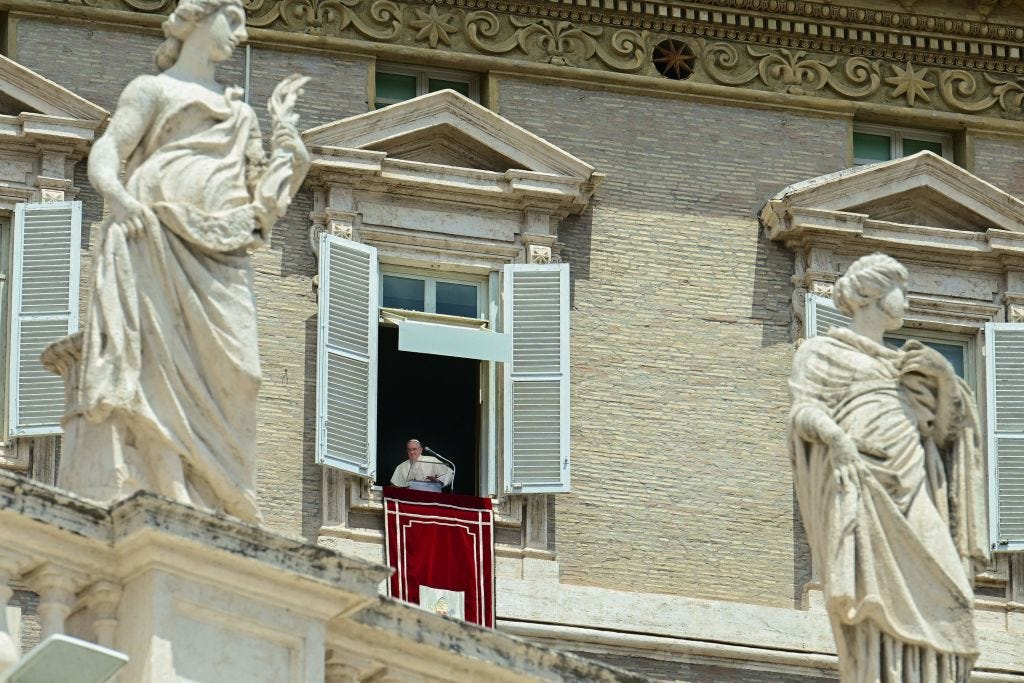Pope Francis's Caution in Publicly Condemning Putin Continues a Vatican Tradition
Institutional history often constrains what popes say and do
"The pope may pray for Putin - but he's clinging to neutrality on Ukraine" reads a Politico EU article published two months into Russia's brutal war on Ukraine. "For Francis, the dilemma is whether to use his moral standing to explicitly denounce Russia or hold back in the hope of creating space for mediation."
The reluctance of Pope Francis to condemn Russian President Vladimir Putin, who personally launched this imperialist war without consulting many military or civilian elites, has sparked discussion within the Church and lay Catholic circles. It can seem puzzling behavior for a pope known for his humanist and forthright stances against other forms of imperialism and brutality.
To be sure, the Pope has not been silent. He has referred to the war as a "cruel and senseless" "violent aggression." On the 100th day of the war, speaking in St. Peter's Square, he lamented that "the nightmare of war, which is the negation of God's dream, has once again befallen humanity."

Pope Francis has been active behind the scenes in diplomatic efforts and has made public his desire to meet with Putin in Moscow. And he bluntly warned Patriarch Kirill, head of the Russian Orthodox Church, not to "turn himself into Putin's altar boy." That unsparing comment reflected his longstanding opposition to the politicization of clergy.
Yet Pope Francis's pronouncements about lay leaders, and Putin in particular, have been vague, and some of his comments have played into Kremlin propaganda. In a May 3 interview, he told the Corriere della Sera that "in Ukraine, the conflict has been created by others" --others than Putin, presumably-- and said NATO's "barking" at Russia's door "perhaps facilitated" the invasion.
Placing responsibility for the war onto NATO is a major Kremlin talking point, and it was trotted out for Putin's May 9 Victory Day speech that presented Russia's "special operation" as self-defense by a threatened nation. That's why a group of scholars of the Vatican and Catholicism have warned that it's best for the Pope to "make very clear and unambiguous statements" to avoid being manipulated by a regime that specializes in information warfare.
Maintaining the appearance of neutrality in situations of international conflict is a Catholic Church hallmark, though, and when Russian Foreign Minister Sergey Lavrov addressed the UN Human Rights Council a few weeks after the invasion of Ukraine started, the Holy See delegate was among the few who remained when 140 other diplomats walked out. And the Vatican abstained on a March Organization of Security and Cooperation vote to investigate possible war crimes committed by Russians in Ukraine.
The moral ambiguity created by such actions bothers even Vatican insiders such as Giovanni Maria Vian, former editor of the Vatican newspaper L'Osservatore Romano. Vian cautions that Pope Francis's sense that he must "show that he is neither on one side nor the other" could create a "historic mess" for the Holy See.
The prompt for this reflection on Pope Francis's positions on Russia's war is the publication of David Kertzer's new book, The Pope at War: The Secret History of Pius XII, Mussolini, and Hitler. It draws on documents from newly opened Vatican archives to give an expanded picture of another pope's "historic mess": the failure of the Catholic Church to denounce the genocide and war crimes of Nazi Germany and Fascist Italy during World War II.
Pope Francis and Pope Pius XII are very different individuals. That's why continuities in their approaches to dealing with atrocities committed by imperialist powers should make us pause. In his book, Kertzer shows how protecting the Church's interests --and the lives of clergy in Nazi occupied territories--meant going to great lengths to avoid any confrontation with Il Duce and the Führer.
"Best to say nothing," the title of one of Kertzer’s chapters, sums up Pope Pius XII's approach, despite the continuous flow of detailed information he received about the German plunder of Poland, the war crimes committed in every Axis-occupied territory, and the roundups and exterminations of Jews and Christians that we know as the Holocaust.
World War II was a conflict of very different scope than the invasion of Ukraine. And yet when Kertzer quotes Pope Pius XII as saying "I have done my precise duty, taking care not to offend anyone, avoiding any particular references, indeed, studiously taking care to say the least possible," it gives a context for Pope Francis's own vagueness and reticence.
Reading this book today highlights continuities in the Vatican's institutional behavior, regardless of who is in charge. As Putin pursues his goal of annihilating the Ukrainian nation, staying the course of caution may not prove tenable for Pope Francis without damage to the Church's prestige and moral authority.




The perversions of religion are as old as the religions themselves. The depths of degradation within the Catholic church, much less its tolerance of genocide, starvation, cruelty, and corruption are without parallel in the world, although every religion has been thoroughly corrupted. The apartheid in Israel, civil wars in India, mass incarcerations in China, genocides in Africa...As long as humans support these perverse institutions, they'll continue to do more harm than good.
Today's Catholic Church has very little prestige and zero moral authority. It seems in no hurry at all to change that.